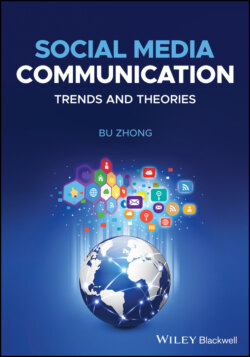Читать книгу Social Media Communication - Bu Zhong - Страница 20
Overview
ОглавлениеSocial media matter more today than before as they are encroaching on all sorts of human activities, for better or worse. Look around and it is evident that social media have been imposing a revolutionary effect on numerous aspects of human society, bringing us a new life largely inconceivable to those who came before. Today our lives are so saturated with social media that few could afford not to use them. How much are our lives are being changed by social media? We may not come up with a good answer to the question until we pause for a moment and see how much we rely on them every day.
Each semester when I taught a social media course, the first assignment was “Without Social Media,” requiring my students not to use social media for 24 hours and to write a reflection on it. No Facebook, Twitter, Snapchat, or Instagram, but they could still make phone calls, send emails or text messages, and of course, use traditional media like books, TV, and radio. Before the experiment, they were instructed to inform their parents and friends of this assignment so that no one got panicky in the hours when they were out of reach on social media.
For this project, most students in past years chose to stop using social media on a Friday night before going to bed. This made it easier for them to survive the time without social media. When they woke up the next day, about one-third of the required time was gone. Each year the one-day social media ban still stunned most students. In their reports, the students wrote that they knew it was hard not to use social media, but never expected everything would be so different and difficult without them. Most of the complaints had to do with the inconvenience, stress, anxiety, and detachment caused by the social media ban. This assignment seemed even more trying for my recent students as more of them told me, honestly, that they failed the assignment – getting back on social media sooner than required, for no particular reason. Yes, during those hours, students could make phone calls, send emails, or text messages. “But without social media, much of my life is lost,” one student concluded.
Social media, apparently, provide users with convenience in communicating with others, sharing, and accessing information. The convenience may be better viewed as a kind of freedom as many get so used to it in the twenty-first century. Without it, they no longer feel free in this networked society. On the other hand, an extensive use of social media results in dependence on technology. Once people are accustomed to the online life powered by social media, any slight disruption of the status quo becomes a major impediment. Similar dependence on prior technologies from mobile phones to cars has been well documented by researchers.
Thus, social media are not so much about media per se but more about being social.
Inherently, all forms of media are social because they store and transmit information and knowledge that originate in social relations in society (Fuchs, 2014). Social media are no exception, as they connect people and their social activities in technological artifacts by facilitating information flows between users. Sociality, in essence, is a key feature of media consumption and production. For instance, when you read the news, watch TV, send a text message, or update your Facebook status, these activities are social, as they are related to other people and their social activities. In this sense, everyone’s thinking is social as it relies on other people’s ideas.
Like other media platforms, social media are profoundly transforming our society, from accessing news to doing business. While Facebook, Twitter, Snapchat, and Instagram get a lot of attention in the United States, Weibo, WeChat, and Line attract millions of daily users in Asian countries like China, Japan, and Taiwan. We should also not forget the popularity of Flickr, Slack, LinkedIn, Path, Pinterest, Tumblr, Vine, and many more. An important reason behind the popularity of social media is that they facilitate a social need for people, not only to connect with others in real-time at a marginal cost but also to create and share information in a similar fashion, which has never happened before in human history.
